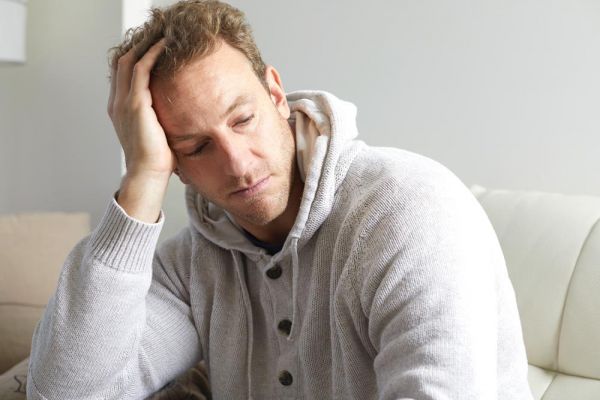 For many of us, depression is a lifelong disorder. In 2019, 19.4 million Americans suffered from major depressive episodes. 29.4 million adults suffer from some form of mental illness, and depression is common in all of them. While many of us eventually seek treatment and attempt to go on with our lives, depression is chronic and recurring. Even for those of us without chronic depression, someone with one of instance of depression is more likely to experience another episode.
For many of us, depression is a lifelong disorder. In 2019, 19.4 million Americans suffered from major depressive episodes. 29.4 million adults suffer from some form of mental illness, and depression is common in all of them. While many of us eventually seek treatment and attempt to go on with our lives, depression is chronic and recurring. Even for those of us without chronic depression, someone with one of instance of depression is more likely to experience another episode.
This means that, even if you’ve sought out treatment and recovered, it’s important to stay aware of your mental health, to continue to seek treatment and assistance, and to take care of your ongoing health. These 5 signs of depression relapse and how to avoid them should get you started by going over some of the most common signs and symptoms of relapse. Of course, it’s also a good idea to continue to attend aftercare, to take steps to preserve your mental health, and to seek ongoing treatment.
Withdrawing from Things You Enjoy
Depression often means that the brain uptakes serotonin and dopamine too quickly or simply doesn’t produce enough. That’s why medical interventions like SSRI’s (Selective Serotonin Reuptake Inhibitors) work. Understanding this means accepting that mental illness is caused by chemical imbalances in the brain, but also understanding that you can recognize when they start to affect you. For example, dopamine’s primary function is to cause feelings of pleasure and anticipation at doing things you enjoy. Serotonin’s primary function is to provide feelings of pleasure. Both of these neurotransmitters and hormones are essential to the proper functioning of the reward circuit, in which you feel good and want to do something and then feel rewarded for doing it.
When depression hits, that stops. While it won’t quite peter to a full halt, you’ll definitely find yourself anticipating and enjoying things less. Reduced interest in your hobbies and favorite things is a good sign that you’re starting to struggle. Even finding less joy in those things might be a sign to look for help. For example, if you find yourself needing more of something to get the same enjoyment out of it, if you do things out of habit rather than really feeling good about it, etc., you might want to seek out help. If you find yourself doing less of the things you enjoy because you can’t really motivate yourself to do them or you’re not really feeling it, consider ramping up your other coping mechanisms, talking to a psychologist, and continuing to participate in those or other activities anyway.
Failing to Keep Up with Chores
Keeping your home clean and organized is one of the coping mechanisms we’re taught to use to deal with depression. But, what happens when you find yourself not keeping up? Or worse, unable to keep up? Failing to keep up with chores and routines is often a sign that we’re feeling bad, not feeling ourselves, or are overwhelmed. All of these are a symptom of depression relapse. What can you do?
- Step back and assess your routine. Are you doing too much? If you’re at a point where you’re working hard for a big life goal (like graduating, moving house, etc.) you’re likely letting other things slip. But if your issue is that you’re taking on too many responsibilities, it may be time to assess what’s necessary and let some things go permanently.
- Assess why you’re not keeping up. If your issue isn’t having too much to do, it might be energy, motivation, or simple forgetfulness. Building strong routines is essential to maintaining long-term discipline for chores like daily cleanup, going for runs, or cooking healthy meals and if you don’t have those routines, it’s important to work harder to stick to the pattern until you have it. Consistently low energy levels and lack of motivation are a large sign of depression relapse and you should talk to your therapist or seek out additional help.
If you’ve let things slip for a few days and can easily pick back up again, don’t worry. If you consistently find yourself slipping and losing control, get help.
Dropping Responsibilities
 Dropping responsibilities is something of a larger version of dropping chores. Rather than missing cleaning up or letting the dishes pile up, dropping responsibilities means you’re late to work, don’t go to work, don’t go to school, don’t pick up medication, don’t take medication, etc. This means skipping large and important life responsibilities because you’re tired, demotivated, or otherwise unable.
Dropping responsibilities is something of a larger version of dropping chores. Rather than missing cleaning up or letting the dishes pile up, dropping responsibilities means you’re late to work, don’t go to work, don’t go to school, don’t pick up medication, don’t take medication, etc. This means skipping large and important life responsibilities because you’re tired, demotivated, or otherwise unable.
If you find yourself in this position, you want to seek help right away. It means you’re already well into depression relapse and you need help. You might be able to correct your own path here once you recognize it, but professional help including therapy is almost always the better choice for long-term results.
Feelings of Stress and Tension
Are you constantly experiencing stress or tension? Are little things that didn’t bother you before suddenly bothering you? Have old stresses and anxieties come back? If you constantly feel pressured and stressed, you’re likely looking at a relapse. Depression heavily overlaps with anxiety and the more depressed you are, the more stressed you’re likely to be. Because stress is also the number one cause of depression relapse, experiencing consistent stress is something to pay attention to either way.
If you’ve attended depression treatment in the past, you likely spent a considerable amount of time on stress management and prevention. If not, taking those courses can help you to improve qualify of life while reducing overall chances of depression relapse. Even taking on stress management courses, participating in mindfulness, and taking mindfulness-based stress reduction can help a great deal.
Trouble with Relationships and Family
Deteriorating relationships is very much a sign of depression relapse, both because people have difficulty adapting to other’s showing symptoms of depression and because depression makes you less-inclined to invest in those relationships. If you’re frequently having fights, struggling to keep up responsibilities, and struggling to motivate yourself to enjoy family and friends, you’re probably experiencing a relapse. The same reward circuit that motivates good self-care motivates social investment. The more depressed you are, the less joy you find in friends and family and the more that shows to them.
Getting help normally means seeking out treatment. That might be a full course of depression treatment intended to help you learn coping mechanisms. It might be a full course of cognitive behavioral therapy intended to help you address the underlying causes. Or, it might be counseling and courses intended to add to treatment you’ve had in the past. In either case, it’s important to remember that depression can be chronic and recurring. It comes back, in different forms, and because of different triggers. Learning how to manage it once doesn’t mean you won’t ever have to learn to manage a new form of it again.
Even if you feel fine, seeking out regular contact with your therapist, attending ongoing counseling and therapy, and touching base with a professional regarding your mental health is a good regular activity. If you know where you’re at, how you feel, and consistently commit to learning things that help you manage depression, you can likely stay in remission for a very long time.
If you need help, the Gooden Center is here. Contact us for a free consultation or assessment.